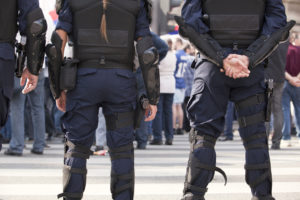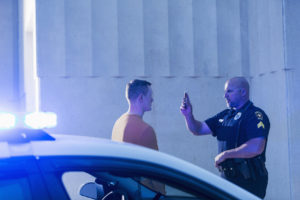What Are My Rights During a Police Stop in California?

Being stopped by police in California can be intimidating and may lead to serious consequences such as fines, arrest, or even a criminal record. You may feel pressured or unsure of what they can say or do, which makes you prone to mistakes that can harm their case.
You have constitutional rights, including the right to remain silent, the right to refuse consent to a search, and the right to an attorney if you are arrested. You are also protected against unlawful detention or excessive force.
However, asserting these rights respectfully while under stress can be difficult. You should, therefore, speak to a legal professional after a police stop to understand if an officer violated your rights.
A skilled California criminal defense lawyer can help by reviewing the circumstances of the stop, challenging unlawful searches or arrests, and building a strong defense to protect your freedom, record, and future opportunities.
Key Takeaway
- You have the right to remain silent, refuse unlawful searches, and request an attorney if arrested.
- Identification is only required when lawfully detained or driving.
- Police aren’t required to immediately explain why they pulled you over.
- Officers generally must provide their name and badge number when requested.
- You can refuse vehicle searches unless exceptions apply, like probable cause, arrest, or exigent circumstances.
- A Terry stop must remain brief and reasonably necessary.
- Call a criminal defense lawyer to protect your freedom and build a strong defense.
What Are My Rights During a Traffic Stop in California
Here are some key rights you have during a traffic stop in California:
- Remain Silent: You have the right to remain silent during a traffic stop. You are not required to answer questions beyond providing your driver’s license, registration, and proof of insurance.
- Refuse Searches: Unless the officer has probable cause or a warrant, you have the right to refuse a search of your vehicle. Politely assert your right to privacy and ask if you are free to leave. Consenting to a search can waive your Fourth Amendment rights against unreasonable searches and seizures.
- Request an Attorney: If you are placed under arrest during a traffic stop, you have the right to request representation from an attorney. A criminal defense attorney can help you understand your rights, support you during the legal process, and protect your interests.
When Do You Have to Identify Yourself to the Police in California
In California, you’re only required to identify yourself to the police under specific circumstances. When driving a vehicle, you must provide your driver’s license, registration, and proof of insurance when lawfully stopped.
This requirement exists because driving is a regulated privilege, not a constitutional right.
California follows “stop and identify” rules more restrictively for pedestrians than some states. You’re required to identify yourself only when lawfully detained during a Terry stop, where police have reasonable suspicion that you’re involved in criminal activity.
Simply walking down the street or being in a public place doesn’t create an identification requirement. If arrested, provide your name and address. Providing false identification information to police is a separate criminal offense under California Penal Code Section 148.9.
However, you’re never required to answer questions beyond basic identification. You can invoke your Fifth Amendment right to remain silent regarding other inquiries about your activities, whereabouts, or involvement in potential crimes.
Do Cops Have to Tell You Why They Pulled You Over in California
In California, police officers are not legally required to tell you why they pulled you over immediately. However, many departments encourage this practice for transparency and safety reasons. Officers have discretion about when and how to explain the reason for the stop.
An officer must have had reasonable suspicion or probable cause to initiate the traffic stop. They should also document the reason in their report. The Fourth Amendment requires that stops be based on specific, articulable facts suggesting traffic violations or criminal activity.
While officers aren’t obligated to explain the reason upfront, you have the right to ask politely. Many officers will provide the reason, as it can help de-escalate the situation and clarify any misunderstandings.
If an officer refuses to explain the reason during the stop, this doesn’t necessarily make the stop illegal. The legality depends on whether reasonable suspicion or probable cause actually existed.
However, if you’re cited or arrested, you’ll eventually learn the alleged violation through the citation or criminal complaint. A criminal defense attorney can challenge the stop’s legality by examining whether the officer had sufficient justification, regardless of what was communicated during the encounter.

Does a Police Officer Have to Give You His Name and Badge Number in California
In California, police officers are generally required to identify themselves when requested. However, specific requirements vary by department policy rather than state law. Most law enforcement agencies have policies requiring officers to provide their name and badge number on request during official interactions.
California Penal Code Section 830.10 requires peace officers to carry proper identification, and many departments mandate that officers identify themselves when conducting official duties. However, there’s no universal state statute explicitly requiring officers to provide their name and identification verbally.
You can politely request the officer’s identification during traffic stops or other encounters. Most officers will comply with this request, as it’s standard practice and promotes accountability.
If an officer refuses to identify themselves, this doesn’t necessarily invalidate their actions or make the stop illegal. However, it may indicate unprofessional conduct that can be relevant in legal proceedings.
The officer’s identity information is also available through police reports, body camera footage, and other official documentation.
Can I Refuse a Search of My Vehicle, and Under What Circumstances?
In California, you have the constitutional right to refuse consent to vehicle searches. However, police can still conduct searches under several specific legal exceptions, regardless of your consent.
When You Can Refuse
You can always refuse consent to a search. Officers may ask permission to search your vehicle, and you should politely but firmly decline. You should not physically resist, but clearly state your refusal.
The state cannot use your refusal as evidence of guilt or reasonable suspicion for further investigation.
When Police Can Search Without Consent
- Probable Cause: If officers have probable cause to believe your vehicle contains evidence of a crime, contraband, or weapons, they can search without your consent or a warrant. Examples of probable cause include smelling marijuana, seeing drug paraphernalia, or observing suspicious behavior.
- Search Incident to Arrest: If you’re arrested, police can search your vehicle’s passenger compartment if they reasonably believe evidence of the arrest offense might be found inside.
- Plain View Doctrine: Officers can seize anything illegal they observe in plain sight during a lawful stop, such as weapons or drugs visible through windows.
- Exigent Circumstances: If evidence might be destroyed or officer safety is threatened, immediate searches may be justified.
- Inventory Searches: If your vehicle is impounded, police can conduct an inventory search of its contents.
- Protective Sweep: Officers may search for weapons if they have reasonable suspicion that dangerous individuals might be hiding in the vehicle.
A criminal defense lawyer can later challenge the search’s legality in court. Passengers also have rights and can refuse searches of their personal belongings.

How Long Can a Terry Stop Last
A Terry stop in California must be brief and cannot last indefinitely. Courts generally expect these investigative detentions to conclude within 15-30 minutes. Even so, there’s no absolute time limit.
The key legal standard is that the stop must last no longer than necessary to confirm or dispel the reasonable suspicion that justified the initial detention. Officers must conduct their investigation with “reasonable diligence” and cannot unnecessarily prolong the encounter.
Factors affecting duration include the nature of the suspected crime, availability of backup officers, time needed to run identification checks, and whether the person cooperates with basic identification requests.
For example, verifying someone’s identity through dispatch typically takes several minutes and is considered reasonable. However, an officer should release you if they lack reasonable suspicion to continue the detention.
Once the investigation concludes, they must either arrest you or release you immediately. Continuing the stop beyond investigation transforms it into an illegal detention.
A judge will evaluate the circumstances of the stop when determining if a Terry stop lasted too long. A police officer can violate your Fourth Amendment protections if they extend the delay for reasons like waiting for drug-sniffing dogs without additional reasonable suspicion.
A criminal defense lawyer can protect your rights after a Terry stop by challenging unlawful detention, suppressing illegally obtained evidence, questioning police conduct, and building a strong case to protect your rights.
How Can a Criminal Defense Lawyer Help Me
You should speak with a criminal defense lawyer after a police stop. They can evaluate your situation, explain your rights and legal consequences, and help make informed decisions about the case.
Here’s how a criminal defense attorney can help after a stop:
- Protect Your Rights: They understand the laws surrounding police-citizen interactions and can guide you on what law enforcement officers can and cannot do during the stop.
- Legal Consequences: A criminal defense lawyer can help you understand the legal implications of the police stop. They can explain the charges against you, the potential consequences, and defense strategies. A criminal defense attorney empowers you to make informed decisions about your case and work towards a favorable outcome.
- Representation in Court: A criminal defense lawyer can represent you in court if the police stop escalates into criminal charges. They have the experience to build a strong defense strategy, challenge evidence presented against you, and advocate for you in front of a judge and jury.
- Negotiate With Prosecutors: A criminal defense lawyer can negotiate with prosecutors on your behalf to potentially reduce charges or secure a plea deal. Their excellent negotiation skills can lead to a more favorable outcome for you, such as a lesser sentence or alternative sentencing options.
Challenge Violations During a Police Stop With Legal Support
Exercising your right to remain silent during a police stop can be difficult, as officers may pressure you into answering questions or imply that silence suggests guilt. An impromptu police stop can pressure you into making statements that can be used against you later.
You may also face challenges in court, such as law enforcement presenting biased testimony or prosecutors pushing for harsh penalties. You may also face the use of evidence obtained under questionable circumstances.
A skilled criminal defense lawyer can step in to protect your rights, challenge any violations by law enforcement, and build a strong defense. With legal support, you gain an advocate who protects your freedom and helps secure the best outcome possible.
Get in touch with a criminal defense lawyer to protect your legal rights.

Frequently Asked Questions
How Can a Criminal Defense Lawyer Challenge the Legality of the Stop?
A criminal defense lawyer can challenge a police stop’s legality by arguing it lacked reasonable suspicion or probable cause required by the Fourth Amendment. They examine whether officers had specific, articulable facts justifying the stop, not just hunches.
If the stop was unlawful, any evidence obtained may be suppressed under the exclusionary rule, potentially dismissing charges.
How Long Could Legal Proceedings After a Stop Take?
Legal proceedings after a police stop vary in duration. Simple traffic violations may be resolved within weeks through fines or court appearances.
However, criminal charges can extend months to years, depending on case complexity, evidence review, plea negotiations, and court schedules. Serious felonies involving lengthy investigations and trials may take several years to conclude.
How Does a Lawyer Assess Whether My Rights Were Violated During the Stop?
A criminal defense attorney assesses rights violations by reviewing police reports, body camera footage, witness statements, and dashcam videos.
They examine whether officers had reasonable suspicion for the initial stop, followed proper procedures, respected your Fifth Amendment right to remain silent, and conducted any searches legally.
A criminal defense lawyer analyzes whether Miranda rights were given correctly. They can also establish if the police obtained evidence through constitutional means or illegal conduct.


